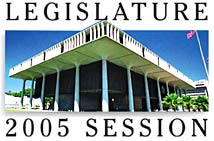Land reform law
is next target
Lawmakers propose ending
the law that forced landowner
to sell leasehold property
When the state Legislature approved the Land Reform Act in the late 1960s, it allowed thousands of single-family homeowners to purchase the fee interest to their properties, and provided broad condemnation powers to the state.
Nearly four decades later, state lawmakers are quietly seeking to repeal the landmark legislation, saying the law has outlived its usefulness.
In the wake of Mayor Mufi Hannemann's repeal of the city's condominium lease-to-fee conversion law, state Rep. Ezra Kanoho (D, Lihue) last month introduced a three-paragraph bill that would take away the state's power to condemn private property to make way for mandatory leasehold conversion.
|
|
At first, House Bill 1523 appeared to be stillborn after it was referred to four committees for hearings. But three of the committees quickly approved an amended version of the bill that pushes the enactment date to 2020.
The bill will next go to the House Finance Committee for a hearing. It then faces a vote by the full House before it would cross over to the Senate.
Enacted in 1967, the leasehold reform act allowed lessees of free-standing homes to acquire the land under their homes, in the belief that home ownership is good public policy.
The law aimed to lower home prices by attempting to break up land control by big property owners such as the Kamehameha Schools, the Estate of James Campbell, Kaneohe Ranch and the Robinson Estate.
The state Housing and Community Development Corp. of Hawaii, which supported the intent of the bill, said that more than 14,600 families purchased the fee interest in their homes as a result of the law.
The state agency said there are about 1,200 remaining single-family leasehold residential homes.
Local attorney Bernard Bays, who represented about 30 homeowners in the 1970s and '80s when they attempted to purchase the fee to their homes, said the 1967 law dramatically changed the market for lease-to-fee conversion and gave the lessees the chance to buy their homes at fair prices.
While he agreed that much of the law's goals have been met, Bays said that's no reason to repeal the law.
One of the key backers of the bill is the Kamehameha Schools, which unsuccessfully challenged the law all the way to the U.S. Supreme Court in 1984.
The estate, the state's largest private landowner, now argues that the basis for the law is no longer valid, since the big land oligopolies no longer exist, and home buyers have plenty of opportunities to purchase fee-simple homes.
In 1978, the estate owned the fee interest in 15,000 single-family leasehold properties. Today it owns about 125 single-family leasehold plots.
David Callies, a University of Hawaii law professor and expert in land-use issues, questioned whether the 1967 law ever "fulfilled its public purpose."
The reform was intended to break up the oligopolies and lower the cost of housing for entry-level home buyers, but wound up benefiting lessees in upper-class neighborhoods such as Kahala and Hawaii Kai, he said.
"People at the lower economic spectrum were supposed to get help, and I didn't see evidence of that," said Callies. "I'm not sure that the law accomplished what it set up to accomplish."
State Rep. Cynthia Thielen (R, Kaneohe), who voted against the repeal, believes it would hurt the hundreds of lessees who have not yet bought the fee interest to their homes.
Thielen said she fears that repeal also would prompt big landowners to get back into the leasehold land business, thereby creating a new leasehold crisis for future generations. "If we repeal the land reform act, I think the whole issue will come back in 30 years," Thielen said. "That, to me, is poor public policy."
Real estate economist Mike Sklarz, a long-time leasehold reform advocate, cautioned against repealing the law without further study.
Repeal won't solve the problem faced by homeowners whose leases are set to expire and whose properties will revert back to the fee owner, he said.
"These guys are playing on this whole momentum of 'let's reverse everything that had to do with land reform,'" said Sklarz, who heads the analytics department at Fidelity National Financial Inc. "But by repealing it, they still have not solved the problem we still have of all these leasehold properties. It's not a pretty picture."
[News] [Business] [Features] [Sports] [Editorial] [Do It Electric!]
[Classified Ads] [Search] [Subscribe] [Info] [Letter to Editor]
[Feedback]

